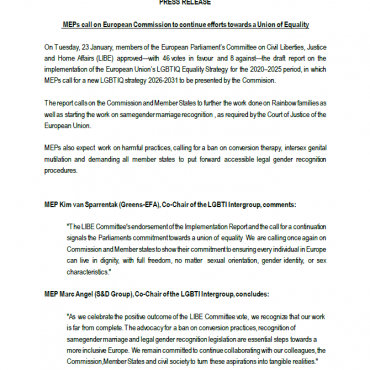European Parliament wants EU countries to recognise existing same-sex unions
On Tuesday the European Parliament reaffirmed that the effects of civil documents (birth and death certificates, marriage certificates, etc.) must remain the same throughout the European Union. This implies that all couples, including same-sex couples in marriages or civil partnerships must retain their rights in all EU countries.

Luigi Berlinguer MEP, Rapporteur
Currently same-sex couples often lose the rights given by their existing marriage or civil partnership when travelling in the European Union.
In its just-adopted report on civil, commercial, family and private international law, the European Parliament “strongly supports plans to enable the mutual recognition of the effects of civil status documents”, and “stresses the need to ensure mutual recognition” of such documents by EU countries. This entails recognising the effects of all existing marriages and partnerships when citizens move in the EU.
Following this vote, the European Commission will propose ways to enable the recognition of the effects of partnerships and marriages throughout the EU, regardless of whether they unite same-sex or different-sex partners.
Ulrike Lunacek MEP, Co-President of the European Parliament’s Intergroup on LGBT Rights, reacted: “This is a great development for the many couples and families who see their fundamental rights diminished every day when crossing a border inside the EU. It’s a vote for equality: everyone should retain their existing rights when travelling in the EU.”
Michael Cashman MEP, the other Co-President of the Intergroup on LGBT Rights, added: “It follows the Commission’s assertion in September that freedom of movement must be guaranteed for all citizens, regardless of sexual orientation. Claims that mutual recognition will ‘undermine national sovereignty’ are plain wrong: it won’t affect national marriage or partnership laws, but simply recognise civil unions that already exist.”
Conservative groups had advised against the positive vote, arguing it risked undermining national sovereignty.
This measure strengthens the universality of fundamental rights for EU residents across borders in the European Union. It does not change national laws on civil unions, which remain a national prerogative.
Updated at 14:45 CET.






